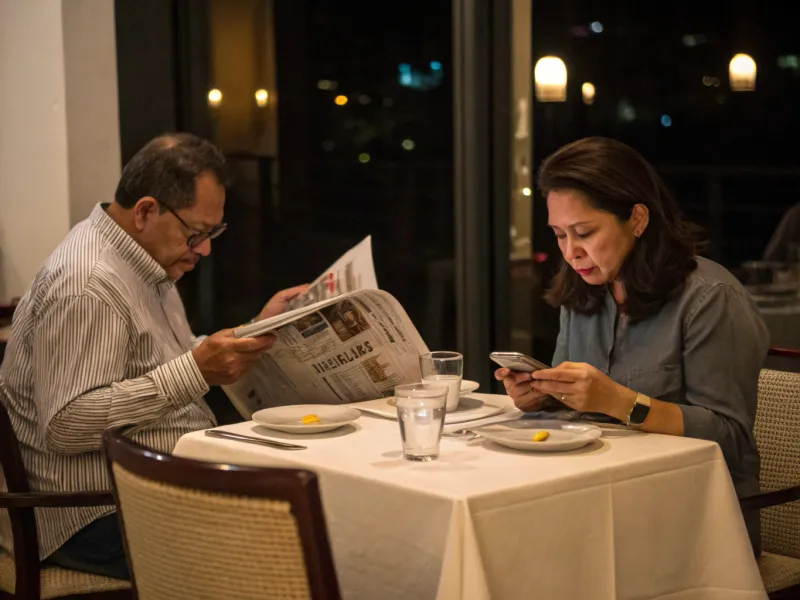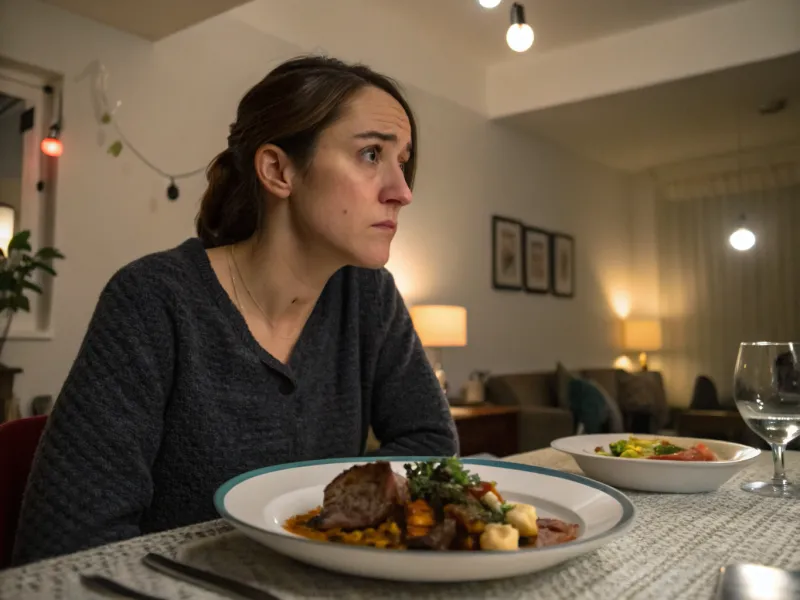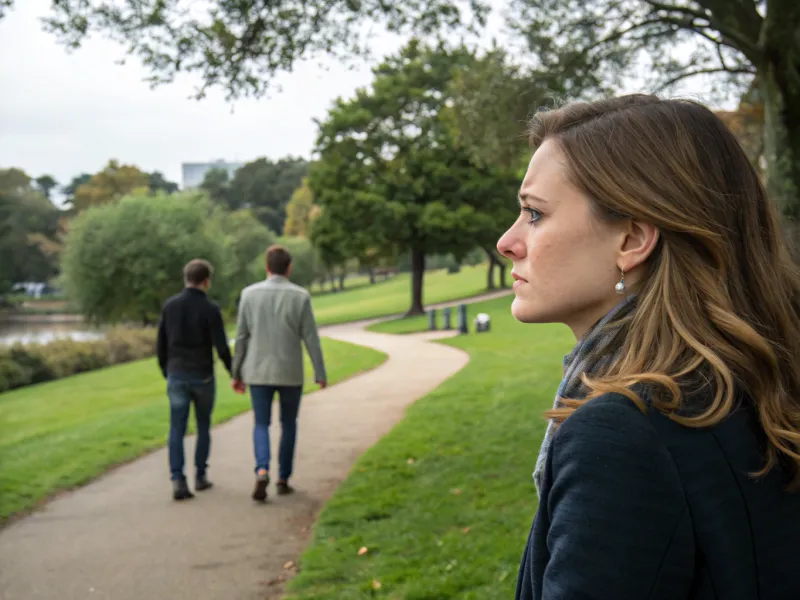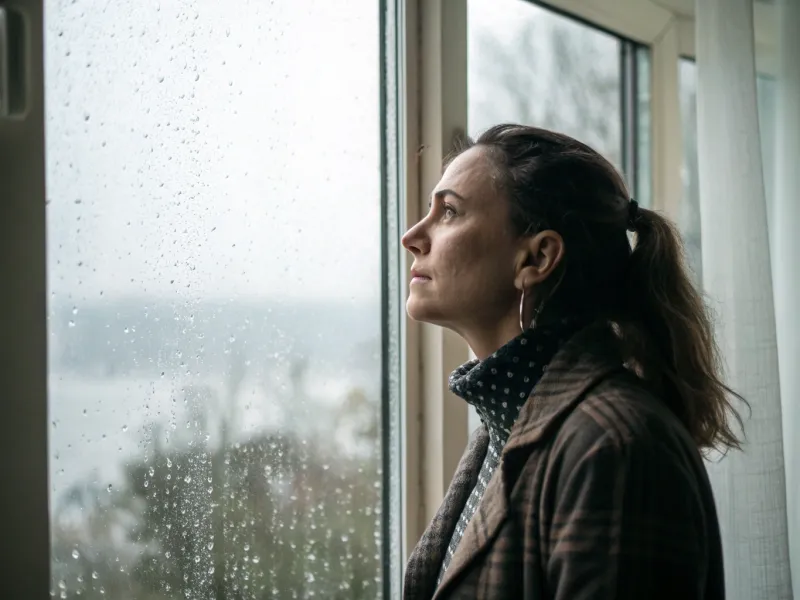30 Signs You’re Grieving the End of Your Marriage While Still in It

Grief doesn’t always come after the final goodbye. Sometimes it starts while you’re still sharing the same bed, folding the same laundry, and eating dinner at the same table.
Grieving the end of your marriage while you’re still in it is a quiet, complicated kind of heartbreak. It’s not loud. There’s no funeral, no big fight, no dramatic exit. Just… slow fading. Emotional distance. A constant ache in your chest that says, this isn’t working anymore—even if you haven’t said it out loud yet.
Here are 30 signs you may already be grieving a marriage that technically still exists—but emotionally feels gone.
1. You cry for no clear reason—and then wipe the tears before they see.

Because sadness feels constant, but invisible. You find yourself brushing away tears while standing in the kitchen or during a TV show.
It’s not like a thunderstorm of emotion, crashing down all at once. More like a quiet, persistent drizzle that never ends. You wipe away the evidence quickly because explaining why you’re sad feels impossible when you barely understand it yourself.
To outsiders, everything seems fine, but inside, it’s different. You become adept at hiding these moments, pretending like nothing’s breaking. Yet, the truth is you’re carrying a sadness that you can neither define nor escape.
2. You fantasize more about peace than passion.

Not about a new love. Just… silence. Calm. Relief. In your daydreams, it’s the absence of conflict that you crave, not fireworks.
When you imagine a future, it’s filled with quiet moments that feel like a balm to your soul. The kind of peace that comes from simply not having to try so hard to make things work.
There’s a longing for simplicity, a life where you’re not constantly navigating emotional landmines. It’s not a desperate escape to a romantic paradise, but a hope for tranquility and space to breathe.
3. You feel lonelier with them than you do alone.

Being in the same room doesn’t mean you feel connected. You can be sitting together, sharing a meal, yet feel miles apart.
There’s a silence that sits between you, heavier than words. It’s not the comforting silence of familiarity but the awkward quiet of two people who don’t know what to say.
This loneliness is sharper because it’s unexpected. You’re with someone, yet you feel unseen, unheard. It’s a solitude that follows you around, even in shared spaces, making you question if this is what life together has become.
4. You stop sharing your wins (or your worries).

What’s the point if they don’t really listen—or care? You used to share everything, from minor triumphs to major setbacks.
But now, you hesitate. You pause before speaking, unsure if it’s worth the effort of trying to engage. The lack of response, the disinterest, has taught you to keep things to yourself.
It feels like shouting into a void. Your joys and pains go unacknowledged, and slowly, you withdraw. It’s easier that way, to not expect the validation that never comes. Your world becomes a little less bright, a little more solitary.
5. You walk on emotional eggshells.

Trying not to trigger anger, judgment, or apathy. Your conversations are calculated, your words measured.
Every interaction feels like a potential minefield, where the wrong word could lead to an explosion—or worse, a dismissive shrug. You become hyper-aware of their moods, trying to keep the peace at any cost.
This constant vigilance is exhausting, leaving you tense and anxious. It’s a dance you’ve perfected, yet it comes at the expense of your own comfort and honesty. You’re always on guard, fearing the reaction more than valuing the connection.
6. You feel more like roommates than partners.

The spark’s not just dim—it’s gone. And no one’s looking for it. You share a space but not a life.
Everything feels transactional, like you’re co-managing a household rather than building a future together. The routines are there, but the warmth is missing.
It’s a relationship of convenience, where the emotional depth has been replaced by surface-level interactions. You miss the companionship, the understanding that once defined your bond. It’s an emptiness that you both acknowledge but neither addresses, living parallel lives under the same roof.
7. You avoid coming home.

An extra errand, a longer drive—just to delay walking through the door. Home doesn’t feel like a sanctuary anymore.
Instead, it’s a place of tension, where the air is thick with unspoken words and unresolved emotions. You find reasons to stay out, to avoid the discomfort of silence or the strain of forced conversation.
The walls that once held laughter now echo with the absence of joy. You linger in your car, savoring the solitude, delaying the moment you have to face the reality that home doesn’t feel like home.
8. You imagine your future without them—and feel relief, not panic.

You’re already emotionally preparing for the exit. When you think about the days ahead, the idea of being alone doesn’t fill you with dread.
Instead, it feels like a path to freedom, a chance to rediscover yourself without the weight of a failing relationship dragging you down. It’s not that you don’t fear the unknown; it’s that the current situation feels more daunting.
This vision of the future isn’t about running away; it’s about moving toward something better, something more peaceful. And that realization is both freeing and sobering.
9. You dread being alone with them.

Silence between you is deafening. When it’s just the two of you, the lack of conversation is palpable.
Every moment stretches out, filled with words unsaid and emotions unshared. It’s a silence that’s uncomfortable, not companionable.
And it’s not just the absence of dialogue; it’s the presence of tension, an unspoken acknowledgment of everything that’s been lost. Being alone together highlights the distance, the disconnect, making you long for a time when silence was golden and not a reminder of what’s missing.
10. You’ve stopped trying to fix it.

You’ve given up before you’ve even left. The arguments, the discussions, the attempts at reconciliation—all feel futile.
There’s a sense of resignation that settles in, convincing you that this is as good as it gets. The energy to fight for what once was has faded, replaced by a quiet acceptance of the status quo.
Maybe you’ve tried everything or maybe you haven’t tried enough. Either way, the motivation to repair what’s broken is gone, leaving you in a state of emotional limbo, where you’re neither moving forward nor willing to go back.
11. You feel like a ghost in your own life.

There, but not really living. You go through the motions, fulfilling your roles and responsibilities, but there’s a detachment.
It’s like watching your life unfold from a distance, where you’re more an observer than a participant. The vibrancy, the connection, the joy—they’ve all faded, leaving behind a shell of what once was.
This ghostly existence is not about being alone; it’s about feeling disconnected from the life you’re living, as if you’re haunting your own memories, yearning for the person you used to be.
12. You go to bed early just to avoid conversation.

Or stay up late to reclaim a sliver of peace. The bed that once felt like a haven now feels like a battleground for silence.
Turning in early is not about rest; it’s an escape, a way to avoid the awkwardness of forced interactions. Or perhaps you linger in the quiet of midnight, savoring the solitude that finally allows you to breathe.
Either way, the bedroom is no longer a place of comfort but a refuge from an emotional storm, where sleep becomes a temporary reprieve from reality.
13. You feel physically exhausted—but it’s not about sleep.

Emotional heaviness takes a toll on the body. Every day feels like you’re wading through mud, each step more laborious than the last.
It’s a weariness that sleep can’t touch, rooted deep in your soul. The constant emotional strain manifests in aches and fatigue, a physical manifestation of your inner turmoil.
Your body carries the burden of unspoken words and unresolved feelings, leaving you drained and lethargic. This exhaustion is a reminder that while you may be physically present, emotionally, you’re hanging by a thread.
14. You daydream about being loved differently.

Not by someone “better”—just someone who sees you. It’s about longing for understanding, for connection that feels genuine.
In your daydreams, you’re with someone who gets you, who makes you feel seen, heard, appreciated. It’s not about perfection but about authenticity.
This fantasy isn’t about escape; it’s about hope, about believing in the possibility of real love. It’s a reminder that your needs are valid, that wanting to be cherished is not a flaw but a fundamental part of being human.
15. You’re mourning the version of them who no longer exists.

You miss the person they used to be—before the disconnect. The laughter, the shared dreams, the partnership that once felt unbreakable.
Now, those memories feel like they belong to someone else, a version of your partner that has faded into the background.
It’s not about holding onto the past, but acknowledging the loss of what once was. The person you fell in love with seems like a distant memory, a ghost of happier times. And mourning them feels like an acceptance of reality, a step toward letting go.
16. You stop expecting emotional support.

Because disappointment has become predictable. You’ve learned that reaching out often leads to unmet expectations.
So, you stop trying. You cease to hope for empathy or understanding, knowing that acknowledging your feelings is not their strong suit.
This realization is both liberating and lonely. Liberating because you no longer put your emotional wellbeing in their hands; lonely because you face your struggles alone. It’s a protective mechanism, an emotional detachment that ensures you won’t be hurt by their indifference.
17. You feel guilty for wanting more.

Like you should be grateful, even when your soul is starving. There’s an internal battle between gratitude and longing.
Gratitude for the life you have, for the stability and comfort. But also, a yearning for more—more connection, more passion, more understanding.
This guilt is a heavy weight, making you question if wanting more is selfish. Yet, deep down, you know that denying your needs only leads to deeper dissatisfaction. It’s a struggle between contentment and craving, one that leaves you feeling conflicted and culpable.
18. You smile in photos but feel numb inside.

Pretending for the world while you’re breaking quietly. The smile seems genuine, but inside, there’s a void, an absence of joy.
Photos capture moments, but they don’t capture feelings. The disconnect between your outward appearance and inner turmoil feels jarring.
This façade is exhausting, maintaining an image of happiness while your heart aches. It’s a silent struggle, where you’re constantly performing for an audience that can’t see your pain. Behind every smile is a story of survival, of trying to hold it all together, even when it feels like it’s falling apart.
19. You’ve stopped arguing—not because things are better, but because you’ve stopped caring.

Indifference is louder than anger. The silence between you isn’t a truce; it’s a surrender.
There’s no point in fighting when the outcome doesn’t matter anymore. You’ve grown tired of the same old arguments that lead nowhere, the endless cycle of blame and defense.
Instead, you let it go, not out of forgiveness, but apathy. This indifference is a scar, a reminder of battles fought and lost. It’s a quiet resignation, where silence becomes a refuge, a way to cope with a relationship that no longer feels worth the effort.
20. You avoid physical intimacy, or go through the motions.

It feels more like a task than a connection. Physical closeness has become a routine, devoid of passion or tenderness.
It’s a chore, something to check off a list rather than an expression of love. You go through the motions, but your heart isn’t in it.
This absence of genuine intimacy leaves you feeling empty, unfulfilled. It’s not just about physical touch; it’s about the emotional void that it represents. A reminder of how far apart you’ve drifted, even when you’re lying side by side.
21. You envy couples who seem emotionally safe.

Not for the romance—but for the trust. You see other couples, and there’s a pang of envy, not for their love but their security.
It’s the ease with which they communicate, the comfort in their silence, the safety in their bond. You long for that sense of being understood without words, the haven that comes from mutual respect and empathy.
This longing isn’t about coveting their relationship; it’s about missing the safety that you once felt. The assurance that comes from knowing you’re truly seen and valued, something that now feels out of reach.
22. You’ve started mentally checking out of shared plans.

Vacations, holidays, retirement—it all feels distant or hollow. The future you once envisioned together seems blurry, unappealing.
You nod along to plans, but your heart’s not in it. The idea of these shared experiences no longer excites you; it feels like going through the motions.
This mental checkout isn’t about indifference; it’s about self-preservation. Protecting yourself from the disappointment of unfulfilled promises, from dreams that no longer align with your reality. It’s a quiet withdrawal, where you’re present in body but absent in spirit.
23. You keep secrets—not out of betrayal, but out of protection.

Because vulnerability isn’t safe here anymore. Once, you shared everything, but now, you hold back.
There’s a fear that opening up will lead to judgment or indifference, so you keep parts of yourself hidden. These secrets aren’t betrayals; they’re shields, protecting your heart from further wounds.
This guardedness is a defense mechanism, a way to maintain some semblance of emotional safety. It’s not about lying or deceit; it’s about self-preservation. A recognition that in this space, your truths are better kept close.
24. You feel like you’re faking your whole life.

Pretending it’s fine, pretending you’re happy, pretending this is still “marriage.” Every day feels like an act, a performance for the world.
The smiles, the small talk, the gestures—they’re all part of a façade that you’ve perfected. Yet, inside, there’s a dissonance, a feeling that you’re living someone else’s life.
This pretense is exhausting, a constant reminder of the gap between your reality and the image you project. Behind the mask is a longing for authenticity, for a life that aligns with your truth, not just the expectations of others.
25. You’re in survival mode—not connection mode.

Just getting through the day without falling apart. Your focus has shifted from nurturing your relationship to simply getting by.
There’s no energy left for connection, for fostering bonds that once felt unbreakable. Everything is about survival, about maintaining some semblance of normalcy amid emotional chaos.
This mode of existence is draining, where every day feels like an uphill battle. It’s not about thriving; it’s about enduring, about keeping everything together with duct tape and hope, longing for the strength to find a way out of the storm.
26. You’ve stopped talking about a future together.

Because deep down, you know you’re not building one. Conversations about the future used to be filled with excitement and anticipation.
Now, they’re nonexistent. There’s a conspicuous silence where dreams once thrived, a void that speaks louder than words.
This silence is an acknowledgment of the truth you haven’t spoken yet—that your paths no longer align. It’s a quiet acceptance that dreams shared are dreams lost, a recognition that the future is no longer a shared venture but an individual journey.
27. You feel invisible—even when you’re giving everything.

Your effort, your pain, your love—it all goes unnoticed. You pour yourself into this relationship, giving everything you have.
Yet, there’s a feeling of invisibility, of being unseen and unheard despite your sacrifices. It’s a loneliness that stings, a reminder that your value is not recognized.
Being invisible isn’t about being alone; it’s about being overlooked, a ghost in your own story. This feeling chips away at your self-worth, making you question if your efforts matter, if your presence is felt at all.
28. You’re emotionally closer to a friend, coworker, or even stranger.

Because someone makes you feel more human than they do. There’s a connection outside your marriage that feels genuine, fulfilling.
It’s not about romance; it’s about being seen, heard, understood. This emotional bond becomes a lifeline, a reminder that you’re not invisible.
These connections aren’t about betrayal but about finding solace, about feeling alive in ways that your marriage no longer allows. They serve as a mirror, reflecting your needs and desires, showing you the parts of yourself that yearn for acknowledgment and care.
29. You mourn moments before they even end.

Because you already know they’re not real. They’re for show. The smiles, the laughter, the gestures—they’re all a performance.
You feel the weight of pretense, the gap between reality and appearance. These moments that once brought joy now feel hollow, a ticking clock reminding you of their temporary nature.
It’s a mourning of what never truly was, an acceptance that the facade can’t mask the emptiness underneath. This acknowledgment is both freeing and heartbreaking, allowing you to confront the truth while cherishing fleeting glimpses of happiness.
30. You’re grieving—but no one around you knows it.

Because you haven’t left. But your heart already has. You carry this grief silently, a secret burden that weighs heavily.
To the outside world, everything seems normal, but inside, you’re unraveling. This hidden sorrow is isolating, a private despair that you share with no one.
It’s a grief without a name, an unspoken acknowledgment of a relationship that’s over in every way that matters. This silent mourning is part of your daily routine, a quiet acceptance of a reality you haven’t yet voiced, but live with every day.
